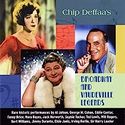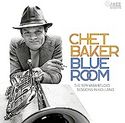|
Let's talk about, toast and remember legends. Like the "Giants in the Sky" he wrote about, the late Broadway giant Stephen Sondheim's shadow looms large. Eleri Ward brings her fresh, fond, folky approach to his work in her third collection of his songs, including the aforementioned one. Next on our listening list is a set called Broadway and Vaudeville Legends that collects performances by big stars of very early times. And, decades after his passing, we have some recently discovered tracks by legendary jazz artist Chet Baker.
 ELERI WARD ELERI WARD
ACOUSTIC SONDHEIM: LIVE FROM BROOKLYN
Ghostlight Records
Digital
How does a performer makes familiar fare feel new? Eleri Ward seems to have taken the advice offered in Stephen Sondheim's song "Move On" in its encouraging words: "Anything you do/ Let it come from you/ Then it will be new." She includes this Sunday in the Park with George piece in her third collection of the late legend's work and indeed the songs feel new and true coming from her, as she again reinvents them, making big Broadway numbers breathtakingly intimate and hypnotic. "Move On" was on her prior release, Keep a Tender Distance, but here it reverts to its stage origins as a duet, shared with strong-voiced Bobby Conte who matches her with intense emotion.
The word "Live" in the set's title, Acoustic Sondheim: Live from Brooklyn, should not let you assume that this is a document of a concert in front of an audience you'd hear applauding. Rather, on the day after Sondheim's birthday in March, the Brooklyn-based Ward recorded "live in studio" renditions of stripped-down arrangements she'd used in concerts.
Those who've been enjoying her prior collections will note that "Move On" is not the only thing to move onto this release's set list (with differences). For example, from the score of Sweeney Todd, she reprises her take on the reprise version of "Johanna" that was on her first release in the trilogy and then had a couple of voice tracks overlapping so she could sing lines written for the characters of both Sweeney and Johnna's suitor, Anthony. Hewing to the "live" arrangement with no technology "magic" involved to clone her voice, it's a straightforward solo vocal line. (But note the inclusion of a couple of phrases written for the Beggar Woman.) It's a "just one guitar" policy for accompaniment, making for an interesting comparison study with some denser previous arrangements on with more strings. And while you may have listened to her "Children Will Listen" on its own before, now it's been wondrously woven into a thoughtfully crafted Into the Woods medley. Separate from the threads of that tapestry is a stand-alone selection from the same score, "Giants in the Sky," simple and effective–and nice to hear beanstalk-climbing Jack's observations in a female voice.
And there's more that is new to the Ward discography. "Good Thing Going" captures its bittersweet memories, regrets and 20/20 hindsight. A marriage of two Company representatives ("Being Alive" and "Sorry-Grateful") mixes together those two views of marriage as a mixed blessing causing mixed emotions.
The spare, neo-folk style is plaintive and passionate. In the high, liquid-like Ward voice, accompanied solely by her own guitar, everything feels authentically personal, sometimes confessional. If Rip Van Winkle woke up today from a snooze that began before 1970 and heard these heartfelt renditions by Eleri Ward, he'd probably assume she wrote the material. We who need no wake-up call to be introduced to Stephen Sondheim's talents can, however, almost imagine thinking that when in the thrall of Eleri Ward's involved interpretations.
 VARIOUS PERFORMERS VARIOUS PERFORMERS
LEGENDS OF BROADWAY AND VAUDEVILLE
Garret Mountain Records
CD | Digital
My cup of nostalgia runneth over and I'm happily drunk on vintage entertainment. It's generously served up in a collection boasting 26 tracks that survey the talents of some immortal Legends of Broadway and Vaudeville delivering their signature songs, novelty numbers, ethnic humor, and plenty of pizzazz. Antique 78 rpm records and performances from radio broadcasts have been polished with fine engineering; the most ancient of the material reaches back many decades to bring us such fun bits of showbiz history as the not-yet-legendary Irving Berlin at age 22 amusingly singing his own sassy words to "Oh, How That German Could Love!" (This was before the later years when he composed all of his own melodies; collaborator Ted Snyder did the honors for this one.) The Berlin-written "Mandy," which had been heard on Broadway in the Ziegfeld Follies of 1919, again brings us the tunesmith in the company of Eddie Cantor and Al Jolson.
Jolson is the singer most prominently represented here, with trademark showstoppers and more. His energetic personality is also on display via some spoken comments before he launches into his specialties. Jolson is pictured on the cover along with two women: Fanny Brice (songs and comedy vignettes) and Sophie Tucker. The latter irrepressible veteran is only heard on a single track, but it's a doozy! Daffy and determinedly glib, the frolicsome oldie is "Old King Tut" aka "In Old King Tutankhamen's Day" by Harry Von Tilzer and William Jerome.
"The Medicine Show" is a terrific long segment written for a film about politics, The Phantom President, with a score by Rodgers & Hart. Listening to its cast members George M. Cohan and Jimmy Durante interacting is a major highlight. Other stalwart stars of yore whose segments can be savored are the strutting Ted Lewis, Nora Bayes (with husband Jack Norworth and alone), Bert Williams, Elsie Janis, Sir Harry Lauder, plus comments on crimes of the times by Will Rogers.
A booklet that comes with the CD has liner notes with anecdotes and biographical bits about the artists and comments comparing various versions of some celebrities' hits (and noting which other releases on the label, Garret Mountain Records, they appear on). My only issue with this new issue is this: While there are mentions of who wrote some of the praised material within the 12-page booklet's song-by-song remarks, there's no list crediting all the songwriters. Room could have been set aside for this since there's no text or illustration under the jewel case where the disc is held and the back covers of that box and the booklet are exactly the same. It feels like an oversight when appreciation of the music and lyrics seems to be a mission, and the target aficionado audience would be curious about the creators not indicated or known.
But I have no complaints about what I can hear. I think you'll be satisfied, too, if you value vintage. Expect to be charmed by Harry Lauder cavorting through his Irish ditties, chuckle when Fanny Brice, in character, says that she has been "going around" with a man for a while–ever since they both were going through a revolving door–or when Nora Bayes puzzles over the old musical question "How 'Ya Gonna Keep 'Em Down on the Farm (After They've Seen Paree?)." And so much more.
 CHET BAKER CHET BAKER
BLUE ROOM
THE 1979 VARA STUDIO SESSIONS IN HOLLAND
Jazz Detective
2-CD SET | Digital | Vinyl
Among music legends, Chet Baker was what some might call a gentle giant, with his frequently mellow and/or melancholy approaches to tunes. Eleven lengthy tracks allow us to luxuriate in his personal style of trumpet-playing and warm vocals (on three selections), in the company of two different sets of partners (piano, bass and drums). Recorded for radio programs in the year he would turn 50, Blue Room: The 1979 VARA Studio Sessions in Holland presents previously unissued renditions that were only recently rediscovered, as they'd been presumed not to have been preserved. It's a better-late-than-never arrival in great sound.
The three affecting vocals are on the standards "Candy" (oh-so-appropriately sweet, but not sticky) and two wistful ballads: "Oh! You Crazy Moon" and "My Ideal." I've always found Baker's singing thoroughly disarming and captivating in its vulnerability and longing, although I know others grouse about his pitch. Anyway, there's tenderness aplenty in the voice, and when he uses it to sail through the music without intoning the words, simulating an instrument's sound, it is one more method for making things dreamy.
Accompanying musicians for the longer session (seven numbers) are pianist Phil Markowitz (who is given much rewarding time of his own in the spotlight), bassist Jean-Louis Rassinfosse, and drummer Charles Rice. The other date's four songs brought in Frans Elsen on piano, Victor Kaihatu on bass, and Eric Ineke on drums. All the above might seem to be in comparable comfort zones, but some musicians had worked for years as the leader's sidemen and others were new to his team and had to play without the expected written charts because Baker forgot to bring them! That's just one bit of history chronicled in the pages of liner notes filled with perspective, biographical information and recounted remembrances, such as essays by those who were in the room where Blue Room's chemistry happened.
The sets feature familiar Baker repertoire, prominent in live shows and past recordings. But there are always improvisations and fresh ideas. A prime example is the 1928 Rodgers & Hart song that titles these Blue Room ruminations; it's a Chet chestnut previously covered both instrumentally and vocally. It's not one that got sung this time around, but his affinity and affection for its lyric's honeymoon-struck sentiment come through in the tender (but not too mushy) treatment.
Two other treats are here for fans favoring Broadway music. Finian's Rainbow's "Old Devil Moon" glows with a cool range of concepts. And if you're one of the more jazz-resisting folks or just preferring a cheerier change of pace from the slower, relaxed tempi, the best thing for you would be "The Best Thing for You" from the Irving Berlin score of Call Me Madam. With cheer, Chet Baker zips through the melody with a series of invigoratingly brisk, bright, brief bursts of brass to start off this gem introduced by Ethel Merman (who was pretty darn brassy herself).
There are two pieces by fellow trumpet master Miles Davis ("Down" and "Nardis") and a Baker original called "Blue Gilles."
The blues showcased in Blue Room leaves room for relaxation. Mournfulness is restrained, rather than raucous or wrenching. The music, confidently understated and tasteful, is the equivalent of slow-burning embers. And that's somehow fitting for this soothing souvenir of Chet Baker, whose legacy still burns bright 35 years after his passing.
|